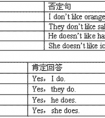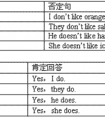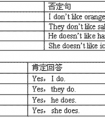根据要求改写句子。1. Canyouspellthesewords?(作否定和肯定回答)2. HeisJack.(对划线部分提问) 3. Annismybestfriend.(对划线部分提问)-四年级英语
I thought you would have finished this by now.
4.will表示习惯、请求,固有性质等。
Everyday he will sit here hour after hour doing nothing.(习惯)
Will you help me with my English?(请求)
The door won't open. (固有性质)
5.Would可表示过去反复发生的动作或某种倾向。
Would表过去习惯时比used to正式,并没有“现已无此习惯”的含义。如:
The wound would not heal.
During the vacation he would visit me every week。
6.表料想或猜想。如:
It would be about ten when he left home.
What would she be doing there?
I thought he would have told you all about it.
情态动词用法口诀:
情态动词两特点,动词原形接后面,说话语气较委婉。
can"能力"may"许可",must"责任"或"义务"。
否定回答needn’t换,"需要"need,dare"敢"。
should"应该",would"愿",haveto"被迫"表客观。
can, could, may, might, must 皆可表示推测,其用法如下:
1)情态动词+动词原形,表示对现在或将来的情况的推测,此时动词通常为系动词。例如:
I don't know where she is,she may be in Wuhan.我不知道她在哪儿,可能在武汉。
2)情态动词+动词现在进行时,表示对现在或将来正在进行的情况进行推测。例如:
At this moment,our teacher must be correcting our exam papers.这时,想必我们老师正在批改试卷。
3)情态动词+动词完成时,表示对过去情况的推测。例如:
The road is wet.It must have rained last night.地是湿的,昨天晚上一定下雨了。
4)情态动词+动词的现在完成进行时,表示对过去正在发生事情的推测。例如:
Your mother must have been looking for you.你妈妈一定一直在找你。
5)推测的否定形式,疑问形式用can't,couldn't表示。例如:
Mike can't have found his car,for he came to work by bus this morning.
迈克一定还没有找回他的车,因为早上他是坐公共汽车来上班的。
注意:could,might表示推测时不表示时态,其推测的程度不如can,may。
考点名称:特殊疑问句
- 特殊疑问句:
以特殊疑问词开头,对句中某一成分提问的句子叫特殊疑问句。
常用的疑问词有:what、who、whose、which、when、where、how、why等。
特殊疑问句往往是就其中的某一成分,进行提问,而且根据情况直接回答,不能用yes或no简单回答。
常见的疑问代词有who, whose, which, what;疑问副词有when, where, why, how。
例:What do you do on Sunday? 你周日的时候干什么?
Which class are you in? 你在哪个班?
Where does Mr. Li live? 李先生住在哪?
Why are you late? 你为什么迟到? 特殊疑问句的构成:
一、 特殊的疑问词。
特殊疑问句要由疑问代词或疑问副词开头,询问的内容不同, 使用的疑问词也不同。
我们学过的疑问词有:
what(询问事物), how much(询问价格),what time (询问时间,尤其是点钟), what kind of(询问种类),why(询问原因),who(询问人), where(询问地点) 等等。如:
—What is this? 这是什么?
—It's a key. 这是一把钥匙。
—How much is it? 这个多少钱?
—It's twenty dollars. 二十美元。
—What kind of movies do you like? 你喜欢哪一类型的电影?
—I like action movies. 我喜欢动作片。
二、特殊的语序。
特殊疑问句由疑问词开头,其构成是“疑问词 + 一般疑问句”。如:
What time is it? 现在几点钟?
Who is your teacher? 谁是你的老师?
三、特殊的答语。
特殊疑问句不能用yes, no来回答,而应根据它所询问的内容直接做出回答才行。如:
— What time is it, please? 请问几点了?
— It's 7:30. 七点半了。
— Where are they? 他们在哪儿?
—They're in the playground. 他们在操场上。
—What's your favorite subject? 你最喜爱的科目是什么?
—English. 英语。
四、 特殊的语调。
一般情况下,特殊疑问句要用降调(↘)来读。如:
Who's ↘that?
How old is↘Jack?特殊疑问句有两种语序:
1.如疑问词作主语或主语的定语,即对主语或主语的定语提问,其语序是陈述句的语序:
Who is singing in the room﹖
whose bike is broken﹖
2.如疑问词作其他成分,即对其他成分提问,其语序是:
特殊疑问词+一般疑问句【特殊疑问词+be/助动词/情态动词+主语+谓语】
What does she like?
What class are you in﹖
Where are you from﹖
What time does he get up every morning﹖
How do you know﹖- 就划线部分提问的基本方法:
小学对特殊疑问句的考查主要采取对划线句子提问的方式,那么在句型转换就划线部分提问的基本方法是:
先根据划线部分词语的意思和句法功能确定用什么疑问词;
然后将原句变为一般疑问句跟在疑问词的后面即可(注意去掉划线部分)。
基本构成:疑问词+一般疑问句
A、对“物”划线用What。
This is an orange. → What is this?
We can see a cat under the desk. → What can you see under the desk?
B、对“地点”划线用Where,如果“地点”作定语时,用Which后跟被修饰的那个名词。
He is under the tree. → Where is he?
Jenny is in the classroom. → Where is Jenny?
C、对“年龄”划线用How old。
Miss Li is twenty-three. → How old is Miss Li?
My sister is five years old. → How old is your sister?
D、对“颜色”划线,用What colour。
Her sweater is red. → What colour is her sweater?
E、对“可数名词的数量”划线用How many +复数名词。
She has one red coat. → How many red coats does she have?
I have six books. → How many books do you have?
F、对“不可数名词的数量”划线用How much+不可数名词。
I want to buy three kilos of meat. →How much meat do you want to buy?
G、对“职业”划线用What。
She is a driver. → What is she?
My father is a farmer. → What is your father?
H、对“星期几”划线用What day。
It's Sunday today. → What day is it today?
I、对“时间”划线用What time。
We go to school at seven in the morning. → What time do you go to school in the morning?
It is five o’clock now. → What time is it?
- 最新内容
- 相关内容
- 网友推荐
- 图文推荐
| [家长教育] 孩子为什么会和父母感情疏离? (2019-07-14) |
| [教师分享] 给远方姐姐的一封信 (2018-11-07) |
| [教师分享] 伸缩门 (2018-11-07) |
| [教师分享] 回家乡 (2018-11-07) |
| [教师分享] 是风味也是人间 (2018-11-07) |
| [教师分享] 一句格言的启示 (2018-11-07) |
| [教师分享] 无规矩不成方圆 (2018-11-07) |
| [教师分享] 第十届全国教育名家论坛有感(二) (2018-11-07) |
| [教师分享] 贪玩的小狗 (2018-11-07) |
| [教师分享] 未命名文章 (2018-11-07) |



![—Can you swim?—Yes ,________[ ] A. I can'tB. I canC. I am-三年级英语](http://www.00-edu.com/d/file/ks/4/1/46/2019-08-24/smallae208768e77b392cb00a5a8a687f84961566582505.jpg)
![_____________ I see that toy panda? [ ]A. canB. mayC. May-五年级英语](http://www.00-edu.com/d/file/ks/4/1/46/2019-08-24/small440f55b4860d5c9b87889948786e71451566582371.jpg)

